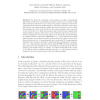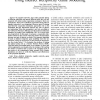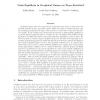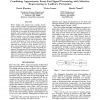533 search results - page 59 / 107 » Playing games with approximation algorithms |
FUN
2010
Springer
14 years 14 days ago
2010
Springer
We study the complexity of the popular one player combinatorial game known as Flood-It. In this game the player is given an n×n board of tiles where each tile is allocated one of ...
GECCO
2009
Springer
14 years 8 days ago
2009
Springer
We apply CMA-ES, an evolution strategy with covariance matrix adaptation, and TDL (Temporal Difference Learning) to reinforcement learning tasks. In both cases these algorithms se...
GLOBECOM
2010
IEEE
13 years 5 months ago
2010
IEEE
In cognitive networks, since nodes generally belong to different authorities and pursue different goals, they will not cooperate with others unless cooperation can improve their ow...
SIGECOM
2006
ACM
14 years 1 months ago
2006
ACM
Graphical games have been proposed as a game-theoretic model of large-scale distributed networks of non-cooperative agents. When the number of players is large, and the underlying...
AAAI
1997
1997
Combining Approximate Front End Signal Processing with Selective Reprocessing in Auditory Perception
13 years 9 months ago
When dealing with signals from complex environments, where multiple time-dependent signal signatures can interfere with each other in stochastically unpredictable ways, traditiona...




